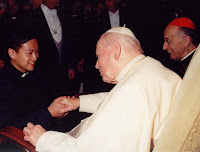
January 26, 2009
Dear Parents,
A Happy Don Bosco Day!
These coming days lead to the 31st of January, the Solemnity of St. John Bosco.
Beginning tomorrow, there will be a special schedule. For the details, please see the timetable given to you through your sons. Here are some guidelines that we would like you to be clear with:
1. January 27-30 are regular class days and thus, the students are obliged to come to school for the Foundation Day Activities.
2. During the Foundation Day Celebrations, the high school students are asked to bring their Student’s Handbook and ID Cards (both School and Foundation Day IDs).
3. These days, the School Uniform is to be worn by the high school students.
4. The students bring extra clothes to be worn for certain activities (outreach, manual work and games).
5. These days, our Bosconians may bring with them mobile phones and electronic gadgets.
6. The time for reporting to school and for going home will vary depending on the timetable for each day.
On Saturday, January 31, the students are not obliged to go to school for the NUV activity. On Sunday, February 1, those who are in-charge of exhibits are asked to come since these will be open to our Mass-goers. On February 2, Monday, there will be no classes. Regular classes resume on February 3, Tuesday.
We thank you and likewise invite you to come to our school and see our different activities. God bless!
In Don Bosco,
Fr. Joel N. Camaya, SDB
High School Principal
P.S. For more details on the Foundation Day Celebrations, please see the following website: http://dbcanlubang.info
